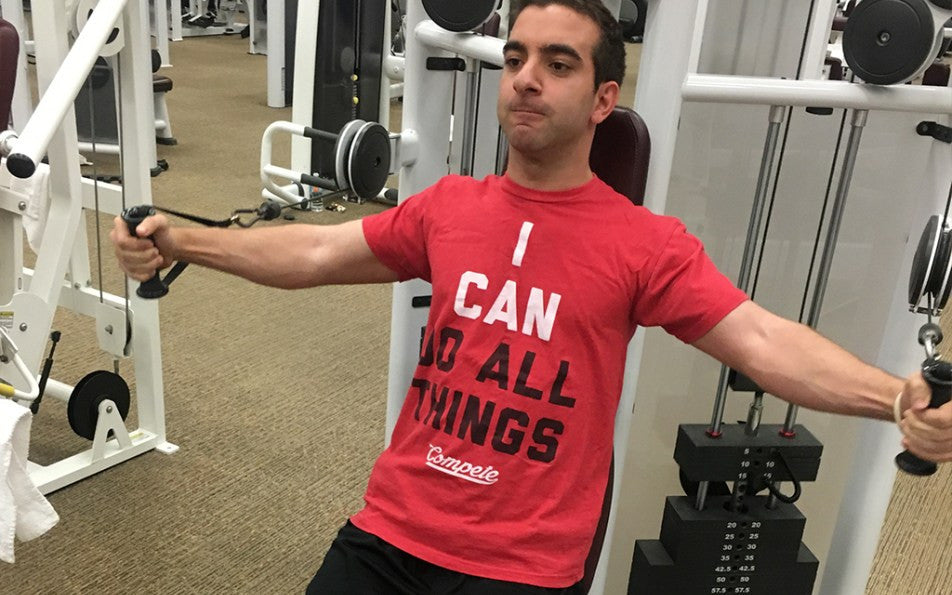Over the years, I’ve realized that for me, Cerebral Palsy is 20% physical and 80% mental. If I tell myself I can walk, I will. But if I tell myself I can’t, I will fall down. It took me 20 years to realize this.
I am 24 years old and was born with Cerebral Palsy. As a result of this, I’m still working every day to get stronger and continue to make strides towards hopefully walking independently one day. Baseball has always been a passion of mine. As I got older, I realized that playing baseball at a high level was not going to be an option for me, so I looked for different ways to stay in the game and make an impact. In high school, I got involved with my high school team serving as team manager. From there, I was fortunate enough to land a spot on the University of Kansas baseball team, serving as student manager for all four years of my college career.
It was during my sophomore year of college that my ability to walk independently took a turn for the better. I had a change in my mentality and my outlook on life. I began going to the gym every day and pushing myself to new limits. Later that year, during a team practice, I walked to the first base foul line, set my walker aside and tried to walk for the first time without my walker. To my surprise, I did not fall. My teammates cheered me on and motivated me to keep pushing myself to get stronger. From that day on, I made it part of the routine to walk from the first base line to the outfield wall without my walker before every practice and game, while the team was stretching.
By my senior year of college, I was able to walk, run, play catch and take batting practice independently for the first time in my life. I even was encouraged to go out one night and leave my walker in my car— so I did.
After college, I was fortunate enough to land a job with the Kansas City Royals. Currently, I work in the front office as the Guest Experience Specialist. In my role with the Royals, I deal with pretty much anything and everything that deals with the guests that visit our ballpark.
2. What’s a typical day look like for you?
These days, I like to stick to my routine. I get to the stadium around 9:00 in the morning, work until 5:00 and then head to the gym. Of course, all of this changes once baseball season starts, but I always try to get to the gym six days a week—with a day off for recovery and physical therapy.
When I get to the gym, I usually begin every workout by stretching out and then riding the stationary bike or stair climber for five minutes. From there, I will lift for an hour, head over to the steam room and finish up in the pool. What makes this pool ideal for me is that it is an indoor walk in pool, so I like to walk laps in the pool at the two foot marker. This gives me enough support, but is shallow enough to give my legs a workout. I usually finish up by jumping as high as I can in four feet of water.
3. What’s one goal you’re currently pursuing outside of fitness?
My life goal is the same one I’ve had since I was 8 years old: to play shortstop. While my playing days are most likely over, I still strive to reach that goal. The way I look at it, if I’m able to stand out there at shortstop, field a ground ball, make a strong throw to first without falling down, I will have beaten Cerebral Palsy. While I can do bits and pieces of these things today, I have yet to do them in one fluid motion.
4. What’s one goal you’re competing to achieve by the end of this year?
To never take a day off, even on the days when you might not be at your best. To push yourself beyond your comfort zone. To work harder than the person next to you. Most importantly, to never give up. To me, that’s what it means to Compete Every Day.
5. What does it mean to you to Compete Every Day?
Over the years, I’ve realized that for me, Cerebral Palsy is 20% physical and 80% mental. If I tell myself I can walk, I will. But if I tell myself I can’t, I will fall down. It took me 20 years to realize this. Once I was able to get over the mental barrier of not having my walker around me, it opened so many doors for me. I am particularly proud of the day that I took batting practice on the field without my walker. I didn’t hit any home runs, but just to be able to hear the sound of the ball hitting the bat made me, for a brief moment, feel like I was living out my life-long dream of playing baseball.
6. What/who do you compete for?
I compete for that little boy or girl out there who may not realize what they are capable of accomplishing. I want to show people, young and old, that no matter what kind of disability you might have, no matter what kind of obstacle you have you overcome, you can do anything you set your mind to. NO dream is ever too big.
Connect with Jonathan: Instagram
The post Why I Compete: Jonathan Rosa appeared first on Compete Every Day.



